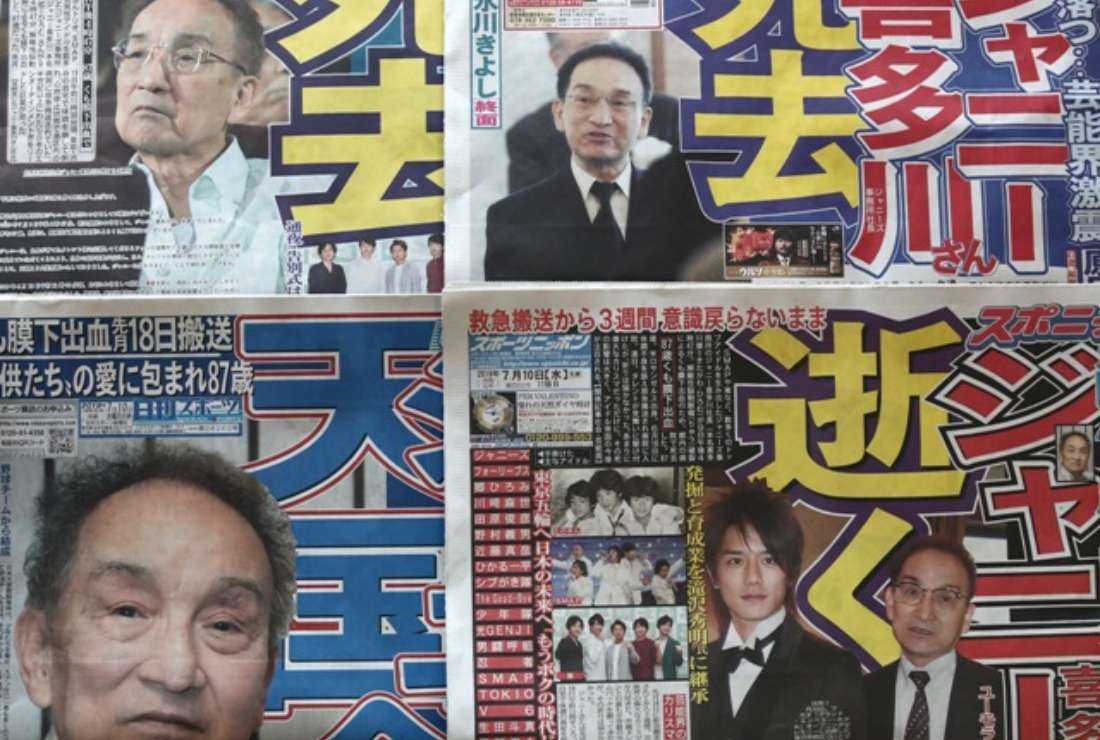
This photo illustration taken in Tokyo on July 10, 2019, shows front pages of Japanese daily newspapers publishing pictures of Japan's leading boyband star-maker Johnny Kitagawa, who died on July 9, 2019. Kitagawa, who built an entertainment empire and broke records with his acts, has been recently accused of repeated sexual assault by a former teen idol. (Photo: AFP)
Behind the glamour of Japan's biggest boyband empire lays a dark truth of sexual abuse and exploitation, and one former teen idol finally broke the silence. The sexual assault allegations by a former employee of a boy band agency made headlines in many news outlets, but the story tells us a lot more — of two worlds, West and East, whose cultural divide seems to be irreconcilable.
In a rare public allegation against the late Johnny Kitagawa, the founder of Japan's largest boyband empire, a former teen idol claimed to have been repeatedly sexually assaulted by the mogul.
Kauan Okamoto, a Japanese-Brazilian singer, made the accusations during a press conference hosted by the Foreign Correspondents' Club of Japan, which the talent agency, Johnny and Associates, established by Kitagawa, failed to respond to. This is the agency that has dominated Japan's showbiz industry for decades.
Okamoto, who worked for the company from the age of 15 to 19, alleges that Kitagawa abused him "15 to 20" times throughout the course of his four-year employment. He thinks Kitagawa assaulted a majority of the “100 to 200" young recruits he worked with at the agency’s office.
The former teen idol declared that he wants the agency's top management, including Kitagawa if he were alive, to acknowledge the abuse and make sure it would never occur again. He also hoped that more victims would come forward.
Although Okamoto found the courage to publicly confront Kitagawa's alleged long-standing history of sexually abusing young boys, the moment he chose was not by chance.
"Some abused teenagers allegedly confessed that their parents knew about the abuses but made them pursue fame"
In fact, this issue first emerged a month ago following a BBC documentary. But I came to realize that most of the media who have mentioned the BBC documentary as the real detonator for this scandal to emerge, have probably never watched it. In fact, if they actually watched it they would have couched the news in a totally different fashion.
Besides the over-dramatic script that reminds of a mediocre Netflix drama, and the inability of the BBC to find a reporter who speaks Japanese, the two fascinating things one learns by watching it is that it was Shukan Bunshun, a Japanese weekly magazine that first came up with the abuse story in 1999, and that some abused teenagers allegedly confessed that their parents knew about the abuses but made them pursue fame despite it.
One guy recalled how his mother cried when he got a call to join the band, as it was her dream — not his — since she gave birth to him.
At one point the BBC reporter is puzzled that people who claimed to have landed themselves in unmistakably inappropriate situations with the former mogul did not seem to hold any grudges. He seemed further baffled on realizing that most Japanese knew these allegations but it didn’t change their view on the music industry nor the affection they have for the bands.
If one thing this documentary taught us is that modern Western ethical beliefs, like the ‘me-too’ movement to “empower the survivors” and hold perpetrators accountable for their actions even if just by hearsay, through a ‘trial by social media,’ don’t really stick in Japanese society.
This one fact was plainly obvious throughout the documentary, even to the reporter who seemed to struggle hard to not accept it. But at the end of the film, this was made clear to him by a 23-year-old former boy band member who now works as an entertainer in the Osaka night district.
"The reporter ended his piece with a reprimand that sounded like a stance of Western moral superiority"
When asked if he felt bad about his former employer, he said no. When asked if he felt bad about the abuses, he said no while adding rather candidly that they’d wanted something in exchange, success.
And finally, when the reporter asked him if he were to receive a proposal to sleep with that man in exchange for success, would he do it? With much serenity and honesty, the former boy band member said yes.
Despite being made crystal clear, the reporter ended his piece with a reprimand that sounded like a stance of Western moral superiority and had nothing to do with the actual evidence he had shown thus far: “These abuses are possible because Japanese society is looking the other way,” he said.
No, the Japanese people did look at it and found it a non-issue. And contrary to the Weinstein case in the US or Jimmy Savile in the UK — which ironically the commentator forgot to mention while pointing a finger at the Japanese as a whole — these were healthy strong guys who, we assume, could have run away anytime from a fragile 70-year-old man.
But “Japanese society” as a recurring culprit seems to be the catchiest leitmotif of many Western media outlets that decree condemnations from a self-proclaimed high moral authority, which, on the other hand, hides many skeletons in their own closet.
* The views expressed in this article are those of the author and do not necessarily reflect the official editorial position of UCA News.


